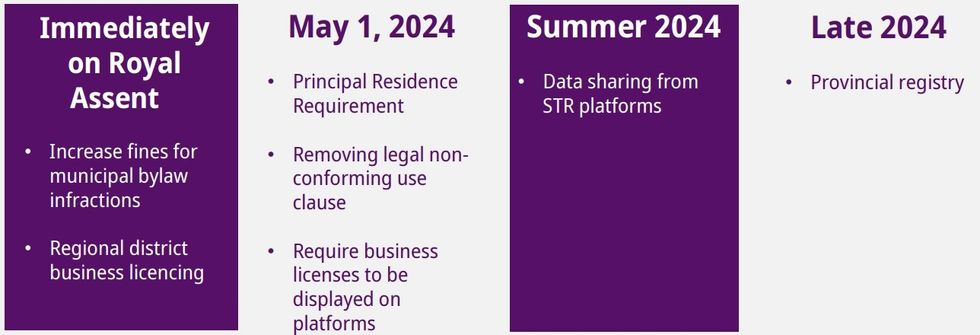In the name of the housing crisis, British Columbia has become the latest government to declare war against illegal short-term rentals listed on platforms such as Airbnb and Vrbo.
On Monday morning, Premier David Eby and Minister of Housing Ravi Kahlon announced the Short-Term Rental Accommodations Act to address the chorus of concern that has grown among local governments in BC.
The new legislation is guided by three major tenets: shifting short-term rentals into long-term homes, establishing provincial rules and enforcements, and increasing fines and strengthening tools for local governments.
Short-Terms to Long-Terms
Like many other governments in North America, the Province is cracking down on short-term rentals in hopes of converting a large portion — if not the majority — of those short-term rental homes into long-term housing that will aid its housing shortages.
To accomplish this, the Province will now require short-term rentals in municipalities with a population of over 10,000 people — exempting resort communities like Whistler — to be offered only in a host's principal residence, including those with a legal secondary suite. According to Inside Airbnb, 32 hosts in Vancouver, as of September 6, 2023, have more than 10 listings on Airbnb, with nine hosts listing over 30 and one host with 123 listings. The principal residence requirement will address this small set of hosts who operate multiple short-term rentals, with the hope being that all those other listings will become long-term homes.
Airbnb was originally created not just for the purpose of helping tourists find short-term accommodations, but also to connect them with a local who could give them travel tips. However, as short-term rentals have been gamified, it's now common for tourists and hosts to never meet. Principal residence requirements can also restore this.
The new legislation will also close some loopholes that are being taken advantage of by investors, as a result of legacy land use bylaws that allowed for short-term rentals before short-term rental bylaws were put in place. The Province notes that in the City of Victoria, where Eby and Kahlon made the announcement, there are currently about 1,600 short-term rentals that the City cannot regulate because of these kinds of legacy rules.
Establishing Provincial Regulations
Short-term rentals are primarily governed on the municipal level, but the Province is now taking on a more involved role as a result of many municipalities saying that they do not have the resources to effectively enforce their regulations.
The Province will establish a short-term rental registry that will require all hosts (and platforms) to register with the Province and display a valid provincial registration number on their listing. Platforms will also be required to validate a host's registration number with the Province and cannot advertise listings without a registration number. They must also ensure listings without license numbers are quickly removed from the platform.
According to the Province, the registry is still in the works and will not become active until late 2024. Platforms will have three months to register, while hosts will have six months.
The Province will then also establish a Short-Term Rental Compliance and Enforcement Unit that will track compliance, issue orders when needed, and administer penalties for violations.
Fines and Enforcement
Under the new legislation, fines levied on operators who break municipal bylaws will be increased from $1,000 to $3,000 per infraction, per day.
In a lesser-used approach, the new legislation will also grant regional districts broad business regulation and licensing powers — a power it does not currently have. According to the Province, regional districts will be able to require businesses, such as short-term rentals, to obtain and maintain a business license to operate, which will contribute towards more effective regulation in rural areas of the province.
The provincial government will require short-term rental platforms to share their data with the Province, including information about hosts, which the Province can then provide to local governments for enforcement and auditing.

The War On Short-Term Rentals
British Columbia joins a list of governments to crack down on Airbnbs and short-term rentals that continues to grow by the week.
New York City, most notably, enacted its ban on short-term rentals in early September. Portugal is currently trying to balance regulating Airbnbs while not hurting its world-class hostels. Quebec recently introduced heftier fines for unregistered listings. Halifax is doing the same thing.
The hope of governments is that cracking down on illegal listings and raising associated fees will drastically reduce the number of short-term rentals and convert them into long-term rental housing.
The crackdowns are all relatively young, however, so there is still minimal evidence that these types of actions will have the desired effects. If anything, from what has been seen in New York City, in just one month of their rules being in place, what crackdowns like this really do is just force illegal listings into the black market, with NYC seeing a surge in listings on Craigslist and Facebook.
Locally, according to the City, Vancouver had a total of 5,049 active listings as of October 5 and have opened 2,150 case files so far this year. The City recently hiked license fees, but Councillor Lenny Zhou, the councillor who has been the most vocal on the issue of short-term rentals, has said that the City needs more resources from the provincial government in order to strengthen its enforcement — a sentiment other municipal governments have repeated. With the new Short-Term Rental Accommodations Act, the Province appears to have gotten the message.
In a widely cited study published by UPGo — the Urban Politics and Governance research group at McGill University — this summer, David Wachsmuth found that short-term rentals were taking 16,810 housing units off of BC's long-term market — a figure the Province alluded to on Monday. The study also concluded that for every single dedicated short-term rental per 100 rental units, the average rent in the neighbourhood increases by at least $49.
"Anyone who’s looking for an affordable place to live knows how hard it is, and short-term rentals are making it even more challenging," Eby said on Monday. "The number of short-term rentals in BC has ballooned in recent years, removing thousands of long-term homes from the market. That's why we’re taking strong action to rein in profit-driven mini-hotel operators, create new enforcement tools, and return homes to the people who need them."
"The short-term rental market is creating serious challenges in BC and around the world," Kahlon added. "Operators with multiple listings are taking homes off the long-term market to make big profits while people pay the price – it can’t go on like this."





















